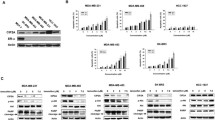Abstract
The present study explored the effects of three commonly used chemotherapeutic agents on the Bcl‐2/Bax apoptosis pathway and the interaction of these chemotherapeutic drugs with the estradiol‐mediated regulation of this pathway. Our results showed that: (1) Treatment of MCF‐7 cells with Adriamycin resulted in time‐ and concentration‐dependent decreases in Bcl‐2 and increases in Bax mRNA and protein levels. (2) Camptothecin elicited similar trends on Bcl‐2 and Bax as Adriamycin, while etoposide, at 50–100 fold (1–5 μM) the effective concentration of Adriamycin and camptothecin, only resulted in an increase in Bax mRNA levels. (3) Adriamycin and camptothecin, but not etoposide, were effective in suppressing estradiol‐stimulated increases in Bcl‐2 mRNA levels. Our study provides evidence that the Bcl‐2/Bax apoptosis pathway may be differentially regulated by chemotherapeutic agents. In addition, interaction between these agents and estradiol on the Bcl‐2/Bax apoptosis pathway may also exist.
Similar content being viewed by others
References
Kerr JFR, Wyllie AH, Currie AR: Apoptosis: a basic biological phenomenon with wide-ranging implications in tissue kinetics. Br J Cancer 26: 239–257, 1972
Carson DA, Ribeiro JM: Apoptosis and disease. Lancet 341: 1251–1254, 1993
Mikulski SM: Pathogenesis of cancer in view of mutually opposing apoptotic and anti-apoptotic growth signals (Review). Int J Onc 4: 1257–1263, 1994
Reed JC: Bcl-2 and the regulation of programmed cell death. J Cell Biol 124: 1–6, 1994
Oltvai ZN, Milliman CL, Korsmeyer SJ: Bcl-2 heterodimerizes in vivo with a conserved homolog, Bax, that accelerates programmed cell death. Cell 74: 609–619, 1993
Sato T, Hanada M, Bodrug S, Irie S, Iwama N, Boise LH, Thompson CB, Golemis E, Fong L, Wang H-G, Reed JC: Interaction among members of the Bcl-2 protein family analyzed with a yeast two-hybrid system. Proc Natl Acad Sci USA 91: 9238–9242, 1994
Sabourin JC, Martin A, Baruch J, Truc JB, Gompel A, Poitout P: Bcl-2 expression in normal breast tissue during the menstrual cycle. Int J Cancer 59: 1–6, 1994
Gee JMW, Robertson JFR, Ellis IO, Willsher P, McClelland RA, Hoyle HB, Kyme SR, Finlay P, Blamey RW, Nicholson RI: Immuno-cytochemical localization of Bcl-2 protein in human breast cancers and its relationship to a series of prognostic markers and response to endocrine therapy. Int J Cancer 59: 619–628, 1994
Wang TTY, Phang JM: Effects of estrogen on apoptotic pathways in human breast cancer cell line MCF-7. Cancer Res 55: 2487–2489, 1995
Teixeira C, Reed JC, Pratt MA: Estrogen promotes chemotherapeutic drug resistance by a mechanism involving Bcl-2 proto-oncogene expression in human breast cancer cells. Cancer Res 55: 3902–3907, 1995
Nenci I, Marchetti B, Querzoli P: Commentary on human mammary preneoplasia. The estrogen receptor-promotion hypothesis. J Steroid Biochem 30: 105–106, 1988
Chabner BA, Longo DL: Cancer Chemotherapy, Second edition. Lippincott-Raven, Philadelphia, 1996
Herr I, Wilhelm D, Bohler T, Angel P, Debatin KM: Activation of CD95 (APO1/Fas) signaling by ceramide mediates cancer therapy-induced apoptosis. EMBO J 16: 6200–6208, 1997
McGahon AJ, Costa Pereira AP, Daly L, Cotter TG: Chemotherapeutic drug-induced apoptosis in human leukaemic cells is independent of the Fas (APO-1/CD95) receptor/ligand system. Br J Haematol 101: 539–547, 1998
Goldwasser F, Bae I, Fornace AJ Jr, Pommier Y: Differential GADD45, p21CIP1/WAF1, MCL-l and topoisomerase II gene induction and secondary DNA fragmentation after camptothecin-induced DNA damage in two mutant p53 human colon cancer cell lines. Oncol Res 8: 317–323, 1996
Jaattela M, Benedict M, Tewari M, Shayman JA, Dixit VM: Bcl-x and Bcl-2 inhibit TNF and Fas-induced apoptosis and activation of phospholipase A2 in breast carcinoma cells. Oncogene 10: 2297–2305, 1995
Sinha BK, Katki AG, Batist G, Cowan KH, Myers CE: Differential formation of hydroxyl radicals by adriamycin in sensitive and resistant MCF-7 human breast tumor cells: implications for the mechanism of action. Biochemistry 26: 3776–3781, 1987
Haldar S, Chintapalli J, Croce CM: Taxol induces Bcl-2 phosphorylation and death of prostate cancer cells. Cancer Res 56: 1253–1255, 1996
Andres JL, Fan S, Turkel GJ, Wang JA, Twu NF, Yuan RQ, Lamszus K, Goldberg ID, Rosen EM: Regulation of BRCA1 and BRCA2 expression in human breast cancer cells by DNAdamaging agents. Oncogene 16: 2229–2241, 1998
Selvakumaran M, Lin HK, Miyashita T, Wang HG, Krajewski S, Reed JC, Hoffman B, Liebermann D: Immediate early upregulation of Bax expression by p53 but not TGF beta I: a paradigm for distinct apoptotic pathways. Oncogene 9: 1791–1798, 1994
Adams JM, Cory S: The Bcl-2 protein family: arbiters of cell survival. Science 281: 1322–1325, 1998
Fornari FA Jr, Jarvis WD, Grant S, Orr MS, Randolph JK, White FK, Mumaw VR, Lovings ET, Freeman RH, Gewirtz DA: Induction of differentiation and growth arrest associated with nascent (nonoligosomal) DNA fragmentation and reduced c-myc expression in MCF-7 human breast tumor cells after continuous exposure to a sublethal concentration of doxorubicin. Cell Growth Differ 5: 723–733, 1994
Fornari FA Jr, Jarvis DW, Grant S, Orr MS, Randolph JK, White FK, Gewirtz DA: Growth arrest and non-apoptotic cell death associated with the suppression of c-myc expression in MCF-7 breast tumor cells following acute exposure to doxorubicin. Biochem Pharmacol 51: 931–940, 1996
Speth PA, Linssen PC, Boezeman JB, Wessels HM, Haanen C: Cellular and plasma adriamycin concentrations in longterm infusion therapy of leukemia patients. Cancer Chemother Pharmacol 20: 305–310, 1987
Piche A, Grim J, Rancourt C, Gomez-Navarro J, Reed JC, Curiel DT: Modulation of Bcl-2 protein levels by an intracellular anti-Bcl-2 single-chain antibody increases drug-induced cytotoxicity in the breast cancer cell line MCF-7. Cancer Res 58: 2134–2140, 1998
Author information
Authors and Affiliations
Rights and permissions
About this article
Cite this article
Leung, L.K., Wang, T.T. Differential effects of chemotherapeutic agents on the Bcl‐2/Bax apoptosis pathway in human breast cancer cell line MCF‐7. Breast Cancer Res Treat 55, 73–83 (1999). https://doi.org/10.1023/A:1006190802590
Issue Date:
DOI: https://doi.org/10.1023/A:1006190802590




